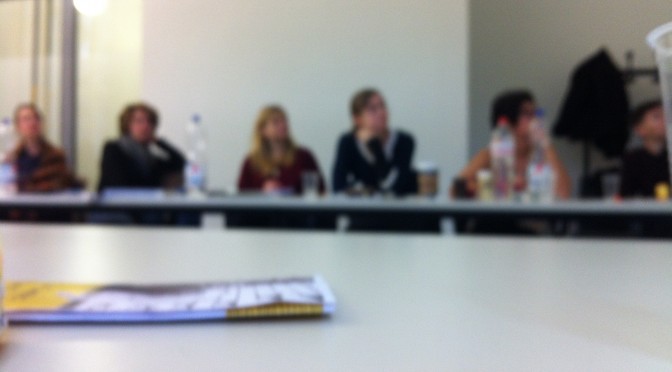By Penny Newell, PhD student in the English Department
Ever since I attended one of Lois Weaver’s Long Tables on Live Art and Feminism, I have been paying a special attention to tables. Tables structure conversations. Tables anchor discoveries. Tables form communities. Tables ground critique.
In Weaver’s Long Table, the table is a centrepiece of a performed conversation, in which you can choose whether or not to participate. It’s an amazingly simple yet effective performance work. It makes you re-think your critical relationship with tables. It makes you ask: Who sits at my table? Who can sit at my table? Who listens? Who speaks?
re-gathering, at the un-tabled margin of our conversation, re-anchoring us to the imagined city
On 19th-21st of November, I co-hosted a three-day event at Humboldt-Universität in Berlin. The event was run through the reading group City-Centric, which I co-convene with Julia Braga-Neves. Challenging the ways in which urban geographies are gendered, and the ways in which these gendering structures are upheld through metaphors, concepts, maps, poems, films and social relations, we spent three days convening around the theme of Sexing and Gendering Urban Spaces. We called this event a ‘workshop’ because we wanted to move away from the conference table arrangement, of speakers and listeners. We wanted something more discursive – closer to a seminar, perhaps, where we might open ideas and materials to creative readings.
In actual fact, we began this ‘workshop’ with a walking tour, doing away with the table altogether.
The tour took in the area of Mitte. Iris Wachsmuth led a group of 30 MA students, from the Literature programme at Humboldt-Universität, and a handful of PhD students from King’s and Humboldt. She was their anchor into Mitte – indexing its architecture and streets from a gender and postcolonial perspective. Much like how a table organises a conversation.
This beginning before beginning had a magical effect. On the Saturday afternoon, we found ourselves sitting around tables forming a square, in a room of glass and stark white walls. As is the way with research events, these tables were strewn with coffee cups and half-eaten biscuits. They were scattered with materials: notebooks, pens, a beaten-up French-language edition of Preciado’s Testo Junkie, and an annotated zine by Brooklynite poet Tommy Pico, @heyteebs.
 ‘I’m going to be so sad when Aretha Franklin dies’, @heyteebs
‘I’m going to be so sad when Aretha Franklin dies’, @heyteebs
Looking around, I could see people fading into and out of listening (as is often the way with research events). Yet there was no effort to hide this state of distraction. This had instead become our accepted mode of critique. We were all here, but we needn’t have been. We could speak, be present, but we needn’t do or be so to exist here. There was a sense in which those who were drifting off were merely re-gathering, at the un-tabled margin of our conversation, re-anchoring us to the imagined, gendered and sexed city, beyond the window.
Penny Newell is a poet and PhD researcher in the Department of English at King’s College London. She co-convenes City-Centric urban studies reading group with Júlia Braga Neves (King’s/Humboldt-Universität). The reading group convenes for talks, seminars, screenings and conferences at sporadic intervals. For more information, or to be added to our mailing list, please email us at: penny.newell@kcl.ac.uk and julia.braga-neves@kcl.ac.uk.
‘I’m going to be so sad when Aretha Franklin dies’ is a line taken from ‘nature poem’, by Tommy Pico; it served as the title and basis of Penny’s presentation in Berlin. Tommy Pico was the Queer/Art/Mentors inaugural fellow, 2013 Lambda Literary fellow in poetry, and has published in BOMB Magazine, Guernica and PANK. Find him at http://heyteebs.tumblr.com/.


